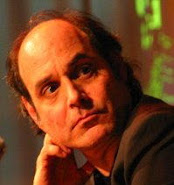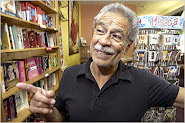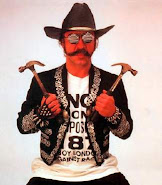
Uncovering Our Familial Histories: An Examination of Cultural and Linguistic Experiences
Lesson plan by Carmen Guzman-Martinez
Division of Bicultural-Bilingual Studies
University of Texas at San Antonio
October 2007
Various electronic sources documenting the life and work of Ramon Gutierrez:
http://www.oah.org/activites/lectureship/2006/lecturer.php?id=135
“Ramón Gutiérrez is professor of history and ethnic studies at the University of California, San Diego. He founded the university’s ethnic studies department in 1989 and is also founding director of its Center for the Study of Race and Ethnicity. Most recently, he coedited, with Richard J. Orsi, Contested Eden: California Before the Gold Rush (1998) and is currently working on two books, Community, Patriarchy, and Individualism: A Cultural History of the Chicano Movement, 1965-1990 and Crucifixion, Slavery, and Death: Genizaro Politics and Identity in New Mexico, 1700-1990.”
http://www.macfound.org/:
“The MacArthur Fellows Program awards unrestricted fellowships to talented individuals who have shown extraordinary originality and dedication in their creative pursuits and a marked capacity for self- direction. There are three criteria for selection of Fellows: exceptional creativity, promise for important future advances based on a track record of significant accomplishment, and potential for the fellowship to facilitate subsequent creative work. The MacArthur Fellows Program is intended to encourage people of outstanding talent to pursue their own creative, intellectual, and professional inclinations. In keeping with this purpose, the Foundation awards fellowships directly to individuals rather than through institutions. Recipients may be writers, scientists, artists, social scientists, humanists, teachers, entrepreneurs, or those in other fields, with or without institutional affiliations. They may use their fellowship to advance their expertise, engage in bold new work, or, if they wish, to change fields or alter the direction of their careers.”
http://www.oah.org/activites/lectureship/2006/lecturer.php?id=135
“Ramón Gutiérrez is professor of history and ethnic studies at the University of California, San Diego. He founded the university’s ethnic studies department in 1989 and is also founding director of its Center for the Study of Race and Ethnicity. Most recently, he coedited, with Richard J. Orsi, Contested Eden: California Before the Gold Rush (1998) and is currently working on two books, Community, Patriarchy, and Individualism: A Cultural History of the Chicano Movement, 1965-1990 and Crucifixion, Slavery, and Death: Genizaro Politics and Identity in New Mexico, 1700-1990.”
http://www.macfound.org/:
“The MacArthur Fellows Program awards unrestricted fellowships to talented individuals who have shown extraordinary originality and dedication in their creative pursuits and a marked capacity for self- direction. There are three criteria for selection of Fellows: exceptional creativity, promise for important future advances based on a track record of significant accomplishment, and potential for the fellowship to facilitate subsequent creative work. The MacArthur Fellows Program is intended to encourage people of outstanding talent to pursue their own creative, intellectual, and professional inclinations. In keeping with this purpose, the Foundation awards fellowships directly to individuals rather than through institutions. Recipients may be writers, scientists, artists, social scientists, humanists, teachers, entrepreneurs, or those in other fields, with or without institutional affiliations. They may use their fellowship to advance their expertise, engage in bold new work, or, if they wish, to change fields or alter the direction of their careers.”
Lesson Plan Title
Uncovering Our Familial Histories: An Examination of Cultural and Linguistic Experiences
Learning Level
Grade level 11-12
TEKS Standards
§113.39. Social Studies Research Methods (One-Half Credit): 4) Social studies skills. The student understands how data can be collected from a variety of sources using a variety of methods. The student is expected to: (A) collect information from a variety of sources (primary, secondary, written, and oral) using techniques such as questionnaires, interviews, and library research; and (B) use various technology such as CD-ROM, library topic catalogues, networks, and on-line information systems to collect information about a selected topic.
Pre-Instruction or Prerequisite Knowledge/Skills
Basic Internet search capabilities and basic writing skills
Lesson Duration
5 sessions, 1-2 hours each
Learning Location
· Computer Lab, online, and in classroom
· Student will conduct research outside of classroom
Materials
· Printer/paper
Learning Objectives
· Students will learn about Ramon Gutierrez.
· Students will learn about their familial history.
· Students will conduct interviews with family members.
· Students will write a family history essay.
· Students will be able to type their essay and print a copy of the essay.
Procedure
1.) Teacher will teach about Ramon Gutierrez.
2.) In a class discussion ask students to think about voices heard or not heard in history and how their family and cultural community has contributed to the history of this nation.
3.) Students will pick a family member to interview.
4.) Using the internet, students will learn how to conduct life history interviews:
http://dohistory.org/on_your_own/toolkit/oralHistory.html
5.) Students will create questions for their life history interviews.
6.) Students will practice interviewing one another.
7.) Students will interview their chosen family member.
8.) Using the internet, students will learn how to write oral history essays:
http://teacher.scholastic.com/activities/writing/
9.) Students will write, type, and print out their family history papers.
The end product should be a well-organized and flowing description of their topic. If students have access to pictures, they can include a collage of pictures as well.
Uncovering Our Familial Histories: An Examination of Cultural and Linguistic Experiences
Learning Level
Grade level 11-12
TEKS Standards
§113.39. Social Studies Research Methods (One-Half Credit): 4) Social studies skills. The student understands how data can be collected from a variety of sources using a variety of methods. The student is expected to: (A) collect information from a variety of sources (primary, secondary, written, and oral) using techniques such as questionnaires, interviews, and library research; and (B) use various technology such as CD-ROM, library topic catalogues, networks, and on-line information systems to collect information about a selected topic.
Pre-Instruction or Prerequisite Knowledge/Skills
Basic Internet search capabilities and basic writing skills
Lesson Duration
5 sessions, 1-2 hours each
Learning Location
· Computer Lab, online, and in classroom
· Student will conduct research outside of classroom
Materials
· Printer/paper
Learning Objectives
· Students will learn about Ramon Gutierrez.
· Students will learn about their familial history.
· Students will conduct interviews with family members.
· Students will write a family history essay.
· Students will be able to type their essay and print a copy of the essay.
Procedure
1.) Teacher will teach about Ramon Gutierrez.
2.) In a class discussion ask students to think about voices heard or not heard in history and how their family and cultural community has contributed to the history of this nation.
3.) Students will pick a family member to interview.
4.) Using the internet, students will learn how to conduct life history interviews:
http://dohistory.org/on_your_own/toolkit/oralHistory.html
5.) Students will create questions for their life history interviews.
6.) Students will practice interviewing one another.
7.) Students will interview their chosen family member.
8.) Using the internet, students will learn how to write oral history essays:
http://teacher.scholastic.com/activities/writing/
9.) Students will write, type, and print out their family history papers.
The end product should be a well-organized and flowing description of their topic. If students have access to pictures, they can include a collage of pictures as well.






No comments:
Post a Comment